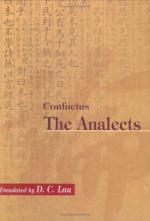|
This section contains 14,929 words (approx. 50 pages at 300 words per page) |

|
SOURCE: "The Humanism of Confucius," in A Sourcebook in Chinese Philosophy, Princeton University Press, 1963, pp. 14-48.
In the following excerpt, Chan argues that Confucius's ideas on humanism greatly influenced the development of Chinese philosophy and that Confucius's belief in "the perfectibility of all men" radically altered the traditional concept of the "superior man."
Confucius (551-479 B.C.) can truly be said to have molded Chinese civilization in general. It may seem far-fetched, however, to say that he molded Chinese philosophy in particular—that he determined the direction or established the pattern of later Chinese philosophical developments—yet there is more truth in the statement than is usually realized.
Neo-Confucianism, the full flowering of Chinese thought, developed during the last eight hundred years. Its major topics of debate, especially in the Sung (960-1279) and Ming (1368-1644) periods, are the nature and principle (li) of man and things. (For this...
|
This section contains 14,929 words (approx. 50 pages at 300 words per page) |

|


